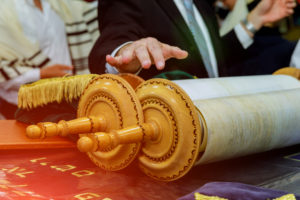
By Rabbi Barry Dov Lerner
Parshat Bemidbar
Have you ever been at a small weekday service, whether to remember a Kaddish or attend a shiva, and you hear someone ask, “Do we have a minyan?” Meaning, are there at least the minimum of 10 present for communal worship?
But the next moment is occasionally a bit strange: Someone — or more than one — looks around the group, points toward each of those present, and says “not one, not two, not three … and then ultimately announces, “We have a minyan!” or that “We don’t have a minyan.” What is this not-counting ceremony?
The what is an incredibly old custom, really a circumlocution, a way to avoid counting people. Old meaning thousands of years.
Why? Why would anyone think we are not permitted to count people for a mitzvah? Frankly, we Jews do a lot of counting.
Does this mean that counting per se in Jewish tradition is a sin? No! Think about Chanukah — we count eight nights. A brit milah is on the eighth day after birth. A b-mitzvah is counted for an age, 12 or 13, respectively. We are now concluding a count of 49 days of the Omer from Passover to Shavuot.
Counting days, weeks, months, even years is not punished. We Jews have been counting everything throughout our history.
Welcome to this week’s Torah portion, Bemidbar, which begins with a census — divinely ordered no less — of all the children of Israel on their way out of Egypt, the second, in fact, since the exodus. We read this Shabbat: Moses is told “Take a census of the whole Israelite community by the clans of its ancestral houses, listing the names, every male, head by head.” [Numbers 1:2-4]
So, what is the reason for “not one, not two, etc.?” Should our tradition really have any uneasiness or even anxiety, even when God orders both? “Yes,” said our rabbinic midrashim based on a biblical precedent.
We read from the Torah only several months ago, that Moses was directed: “When you take a census of the Israelite people …” he is then instructed how to conduct the census in detail. “… Each shall pay the Lord a ransom for himself on being counted in order that no harm occur to them …” [Ki Tisa, Exodus 30:12].
What is the difference between the two census procedures? In the first mandate, they are told to collect a half-shekel per person. Then they are to count the total half-shekels gathered. In this indirect method, the number of Israelites is learned. But specifically, in this way we also are ransoming our souls; we prevent any harm to any individual or the entire group.
One would think that to count otherwise is to perhaps tempt fate and somehow sin by directly counting people. So, we count “not one, not two, not three …” to avoid a plague.
Did it ever happen? Yes! In fact, the Bible records that census which resulted in a plague, interpreted by our sages as a punishment. After Israel is established as a nation with a king who conducted a census at God’s direction that tally did go terribly wrong.
King David is ordered to census of Israel [II Samuel 24], and this same directive is repeated again later in the Bible [I Chronicles 21]. Both narratives are described by our sages as a sin that deservedly resulted in a plague in which 70,000 died.
Perhaps what made it a sin was how King David took his census suggested our sages; David failed to follow the protocol of not-counting, of collecting coins to count and the subsequent deaths were a divine punishment.
Nonetheless, this returns us to our Torah portion this Shabbat and raises new questions: Why doesn’t our portion this Shabbat repeat the protocol for taking a census? Why not also require a ransom for each soul? Why is there no parallel warning of a danger of negef, or plague? What is the difference between these instructions for conducting a census? And a population survey is needed for, after all, every administration of a country needs to know for how many citizens is the leadership to provide.
What do the scholars interpret those deaths resulting from King David’s census that since then to the present have occasioned “anxiety” or is it just what many consider a superstition?
Rashi writes that counting Israelites individually triggers the “evil eye” and brings a plague, consistent with the Talmudic sage Rabbi Eleazar: “Whosoever counts Israel violates a negative precept” [Yoma 22b]. Therefore, they must conduct every census using objects such as half-shekels and then count the objects.
His grandson, the Rashbam, counters with a practical rationale: This was a military determination to ascertain the number of fighting men and their organization for forthcoming battles.
Nachmanides (the Ramban) agrees with this last suggestion that we cannot just depend upon divine miraculous victories a wise balance between trust in God and human commitment. And he also cites contemporaries that human beings are not objects or possessions to be inventoried. Every soldier is a person who has an importance and value deserving of God’s love and our respect.
War is terrible, and inevitably they will be confronting future battles. The death or injuries to any one soldier is a tragedy and while his military role might be restored numerically, as a human being he cannot be replaced. Every soldier is or could be a husband, son, father and grandfather, uncle and cousin — part of a larger family — and each is vital to klal Yisrael, the people of Israel.
When we ask aloud “is there a minyan?” and we count those present, let’s keep these values in mind as we count people. Let’s also be people on whom the community can count! Keyn yehi ratzon.
Rabbi Barry Dov Lerner is the editor and president of JewishFreeware.org and president and rav hamakhshir of Traditional Kosher Supervision LLC. The Board of Rabbis of Greater Philadelphia is proud to provide diverse perspectives on Torah commentary for the Jewish Exponent. The opinions expressed in this column are the author’s own and do not reflect the view of the Board of Rabbis.





